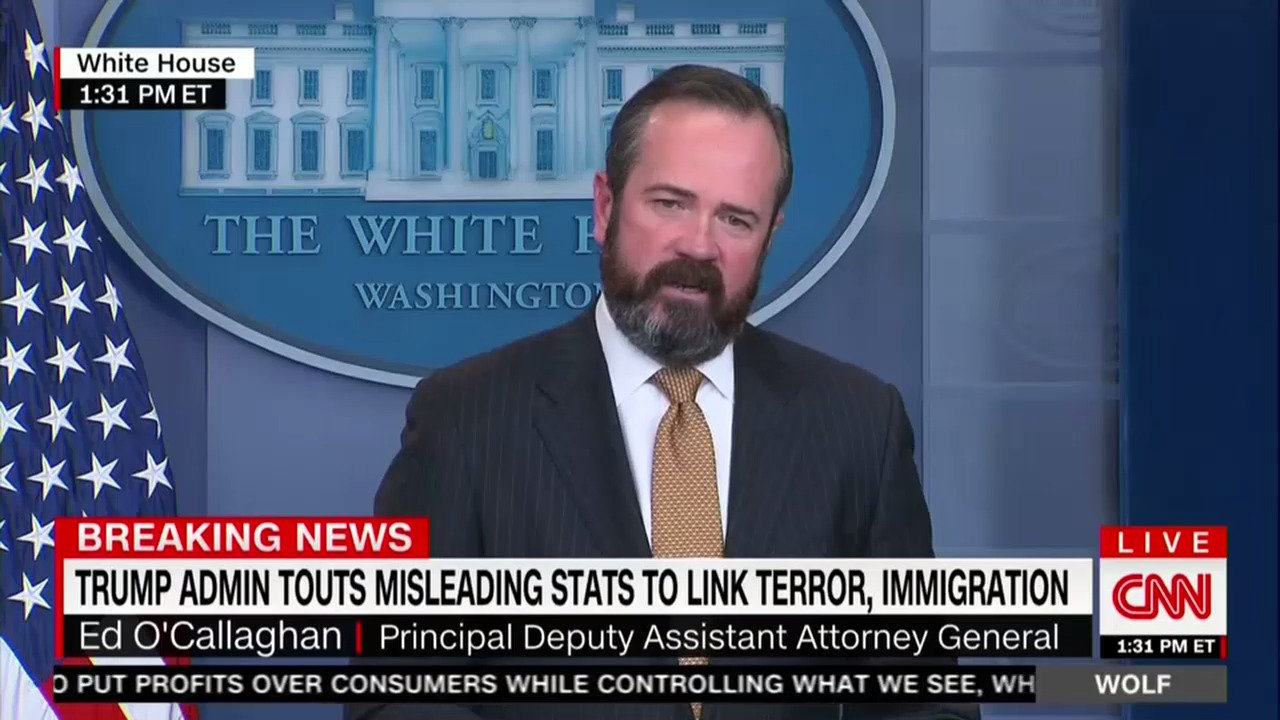During a White House news briefing on Wednesday, Ed O’Callaghan, principal deputy assistant attorney general, struggled to defend a misleading Department of Justice report that claims three out of four individuals convicted in recent years of international terrorism or terrorism-related offenses were “immigrants.”
As ThinkProgress detailed on Tuesday, there are a number of problems with the report — including its reliance on a broad definition of “immigrant” that includes people extradited to the U.S. for trial. In other words, a person who plotted or committed a violent act abroad and came to the U.S. only to face trial could be considered an “immigrant” under the DOJ’s criteria.
On Wednesday, O’Callaghan was pressed about that issue — and had no good answers.
“You talked about the immigration system and reforming the immigration system to defend Americans in the United States, but a lot of the crimes that you’re using as examples to justify changing the immigration system are crimes that were attempted or would have taken place outside the United States — people wanting to travel outside the United States to fight, providing support for fighters outside the United States,” Andrew Feinberg of BroadbandBreakfast.com said to O’Callaghan. “And I understand there’s a nexus there with U.S. forces in those regions, but if the point is to reform the immigration system to protect Americans, can you provide more information, more statistics that show doing so would have prevented people from coming in that committed more crimes inside the United States?”
O’Callaghan could not. Instead, he offered the excuse that “this is the first iteration of this report” and added, unconvincingly, that “we are trying to prevent terrorist attacks, so the most successful prosecutions I’ve ever been involved in are ones where we actually are able to stop it at a conspiratorial stage.”
“So there are individuals who clearly through their conduct are their activity and what they are saying are agreeing to commit a terrorist act in furtherance of the goals of a foreign terrorist organization, but we in conjunction with our law enforcement partners are able to prevent it, convict them, and then they will be included,” he added.
Unsatisfied with that response, Feinberg followed up and asked O’Callaghan to explain “how preventing people from coming in who were conspiring for instance to go to fight in Syria would have protected us in the United States. These are international terrorism crimes and they weren’t all planning attacks in the United States, they were planning things overseas, and you want to reform the immigration system, and it seems like your focus there should be on things that people did in the United States to people in the United States.”
Again unable to address the criticism substantively, O’Callaghan said, “I firmly believe that, and I know that the fact that there are individuals here in the United States that are willing to, in support of ISIS-related philosophies, engage in and talk about engaging in committing acts here in the United States that we’re able to prevent — I think that makes the American people safer and I know the Trump administration does.”
Even though the DOJ’s report is misleading — it doesn’t even account for domestic acts of violence like murders perpetrated by white supremacists — the Trump administration is using it to push for new laws curtailing legal immigration to the country.
3 out of every 4 individuals convicted of international terrorism-related charges between Sept 11, 2001 and Dec 31, 2016 are foreign-born individuals who entered the United States through our immigration system. More: https://t.co/Tx6DSeRxhM pic.twitter.com/uxFujbCieC
— The White House (@WhiteHouse) January 17, 2018
In fact, immigrants — both authorized and unauthorized — are less likely to commit crimes than the U.S.-born population.
